Now I’m not one of those people who condescendingly heap scorn upon anyone who has no locals amongst their group of friends. From personal experience I know how hard it can be to get close to the natives when you don’t work. Not necessarily because of your own attitudes but often because of theirs: why should they be your friend when you’ll probably be off in a couple of years? Even worse, why should they let their children get close to yours when those friendships will be broken just as they finally trust each other enough with the name of their latest crush? Additionally, you’ve probably got a lot more in common with other expats who, like you, have left behind their home country and culture to strike out on a grand adventure. Even if your expat friends aren’t the same nationality as you (and to me, meeting people from all over the world is one of the best things about this life), they are still likely to have more in common with you than someone who has never left home.
So no I am not against having expat friends. I say grab whichever friendships you can – especially at the start. Loneliness and isolation is a very real and not always acknowledged part of this life, so never feel guilty for making a friend with someone just because they are not a host-country native.
However.

How do I get out of this bubble?
This does not mean you should never leave that safe, expat bubble. After all, isn’t one of the reasons you moved to another country the opportunity to explore a new culture? Won’t you feel slightly cheated if you go home having never stepped out of your comfortable little world? But I know that sometimes doing this can be harder than it sounds. As already mentioned, most locals are not going to be desperate to be your best friend. They will already have circles of friends and/or family and as you get older and more settled, reaching out to new people isn’t always that high up on peoples’ agenda. So don’t expect to immediately gain a whole new circle of best mates from the local populace. It may happen eventually (or it may not, depending on where you are) but you could find it hard to get close to people other than fellow expats in the first year or two.
So, how do you get out of that expat bubble? Well – this is where you need to get a bit creative. Literally, in some cases. What you need is to find something that brings you into contact with nationals from your host country where you will all be focused on doing the same thing and where chat will naturally flow. Something like….ok, this is going to sound weird, but dog grooming. Yes you read that right – and had someone told me even a few months ago that I would have been doing a dog grooming course during my time in South Africa, I would have thought they had been drinking too much of the Kool Aid. But hear me out.
When we first got our puppy Miniature Schnauzer Cooper, we knew that he was a dog that needed a lot of grooming. His hair doesn’t fall out but it grows – fast. He can turn from a perfectly turned out shorn boy to a yeti in what seems like a matter of a couple of weeks. So we got in touch with a local man who comes to the house and does a wonderful job making Cooper look like he’s just stepped out of the puppy parlour. But while we can afford to get this done on a regular basis here, I know that when we return to the UK this is going to eat deep into our pockets. So when the chance to learn how to do it myself came up I jumped at the chance.
And it was so much fun! Run by the professional breeder who sold us Cooper the course was basically a load of middle aged South African ladies (and me) laughing our way through the day. We were each presented with our own dog to practise on and there is nothing like chortling at your sheer ineptness to bond you with a bunch of strangers. Although I was the only “outsider” there, and there was the occasional break into Afrikaans for me to contest with, the fact that we were all there for the same thing meant I was just as included as everyone else. And even though none of those women were ever going to be my lifelong friend, for one afternoon I was emerged in the local culture completely and could almost forget I was even an expat.

My very patient guinea pig….(yes I did that!)
Similarly aother friend (you know who you are) started mosaic classes with a local art teacher. Classes like these mean that with everyone focused on art and not on each other it doesn’t matter whether you were born and bred five miles or 5,000 miles away. Barriers break down and over time real friendships can be formed.
For my children too I have found a great way to get them away from their international school bubble – local swimming classes. Both of my children train at the high performance centre at TUKS, which is the University of Pretoria’s top class sports facility. So top class that a 2016 Olympic gold medallist also trains there! But most importantly, the girls are surrounded by South Africans. With most of their friends being Americans, Scandanavians, Germans, other Brits etc it’s great to see them both swimming alongside and chatting with South African children. And sitting as I was with them at 7.30am at the swimming gala on Saturday morning I really got to feel I was taking part in something very South African!
We’re only here for another 8 or 9 months and I still feel like I am just scraping the surface of this country. I know I am unlikely to ever really blend in. But while I am here I am trying to understand the local culture (or should I say cultures – this is a country made up of as many people as any I have ever lived in). I know I could be doing a lot more – I could volunteer with a local charity or vow to seek out as many local friends as possible. Yet I have to be realistic. There are only so many hours in the day and most of those are taken up with work, looking after the children, shopping, cooking, dog walking – you know, day-to-day stuff. But whilst I realise I won’t ever be completely immersed in this country, I will always have my day of dog grooming!
So get out there, look for those opportunities. And if you find something or if you are already taking part in an activity that helps you to immerse in the local culture please let me know in the comments section below. I’d love to hear what you lot get up to 
**********
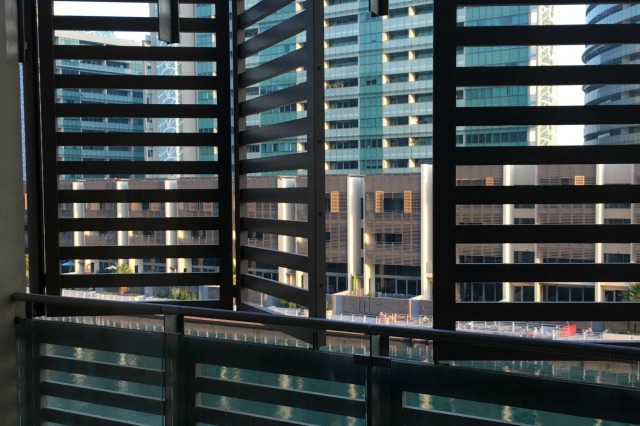
6.19am Our day normally starts when the first child wakes up; this can be anywhere between 5.30am and 7am on really lucky days! On a standard school day though we need to be up and at it by 6.30am Not a bad view to wake up to though, we live in a fairly new beach front development “off island” in Abu Dhabi, Al Raha Beach. This is the view from the top floor of our townhouse (4 floors high!)

7.25am We have 3 kids to try and usher out the door for school by 7.25am if we can. The International school the oldest two attend is only a few kilometers away but traffic lights are rubbish and we spend 15-20 mins every morning sat in the school run queue. We have rather a large car to fit our collection of kiddy seats – and kids (they are sadly not compulsory in the UAE but no way we’d go anywhere without them). Our littlest one is only 1, he attends the British nursery near the school.

8.35am My favourite part of the day once the kids are dropped off! I start my working day by heading down to the beach front for a coffee. Here I catch up my overnight emails and social media. It’s too hot now for sitting on the beach itself but it’s a great, friendly little place – and makes me love my work from home jobs!
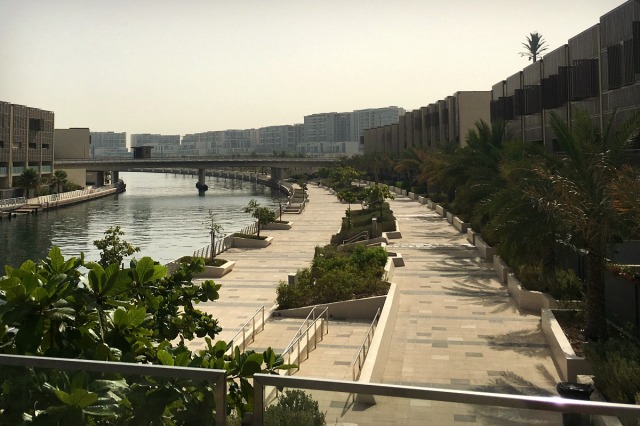
9.25am Walking back to my house – it’s a mixed development along the man-made Al Raha Beach (slightly inland from the Persian gulf coast) with apartments, townhouses, villas and some commercial buildings – Etihad Centre is right behind our house. It comes with the convenience of a little supermarket and a few shops. The only real hassle here is parking.
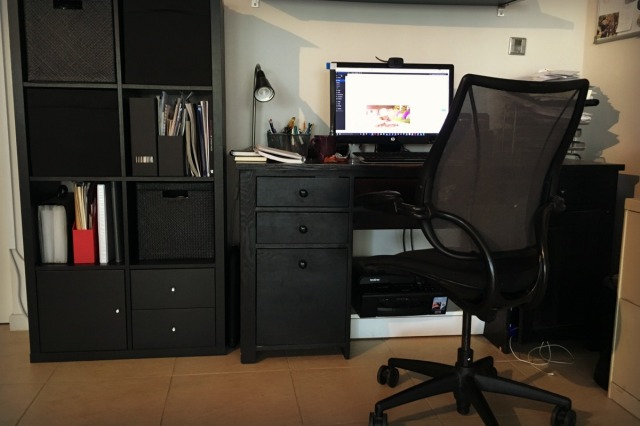
10am Where the work gets done! Back to my desk for the next few hours until kiddy pick up times. Once or twice a week I might be at client meetings but mostly working at home in front of the PC, three mornings a week while my youngest is at nursery.

12.30pm Lunch is just something quick and simple like toast or sandwich. NB note the kitchen only looks immaculate as we have a full time helper. She cleans the house while the kids are at school which is *amazing*

2.45pm School pick up run starts again around 1.45pm when I leave our house, then with staggered finish times over two locations – at least if I am not picking up extra kids, dropping off for play dates etc – it takes about 1.5hrs to get home again. As you can see our cars are big (to fit all those car seats!) but having a 4wd or “Mummy Tank” is fairly standard issue here.
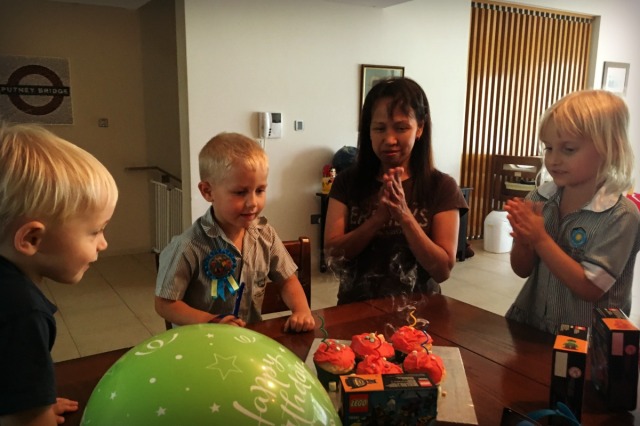
3.15pm Today is slightly special and different as it’s my middle boy’s 4th birthday. We always get a special cake and treat on our actual birthday, he will have a pool party on the weekend with his friends. Afternoons while it’s hot they will generally stay in the playroom or play in the pool until dinner time.

5.45pm As a special treat we let the kids pick birthday dinner and we all go out, including some of my husband’s relatives who live in Abu Dhabi too. We are very lucky to have this connection here and make things like birthday celebrations special – they love their Uncle Sean! My Master L will basically only eat pasta so he picked Carluccio’s at Eastern Mangroves, another fairly new waterfront development.
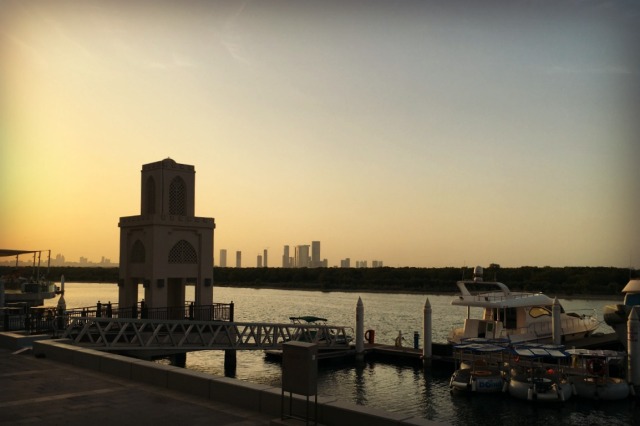
6.30pm The high life when you have kids! All done by about 6.30pm to be home in bed around 7pm. This is the view from the gorgeous Eastern Mangroves marina back to some of the high rises on Reem Island. There really is no ‘centre’ of Abu Dhabi, just lots of awesome little spots to explore.
Thank you Keri for that look at your expat life. Please check out our other posts in this series if you haven’t already done so and let me know if you would like your expat life to be featured in a future post!
This is such an important subject and I am so happy that it is getting the attention it deserves by being featured on such a well-read media outlet. I have had lots of visits to this blog on the back of the article, as well as seen it shared over and over on Facebook with – so far – not a single negative comment (pretty rare these days, I have been finding!).
If you are affected by this issue then please read the article, look at my other blog posts on the subject, and get help if necessary (one of my posts gives details of some places you can start to look for this help). And if you know someone you think might be suffering from depression, consider sharing the post with them as a way to help them take the first step towards getting help.
This is too important a subject to ignore.
In this entry to my series, Annie Wright of A Wright Adventure (also on Facebook and instragram at awrightadventure) takes us through a day with her three beautiful boys, from sun up to sun down. I can hear those cicadas and smell that dusty road from here!
————–

6:30 : Sun rise walk / run to drop big boys of at school bus.

7:00 : Breakfast with my baby blue. Although most of his seems to go on the floor.
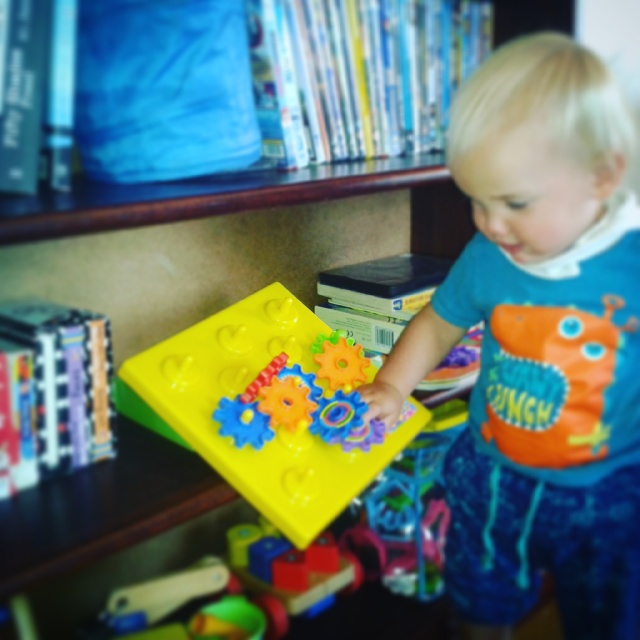
8:00 : Baby blue gets as many toys out as possible!

10:00 : Outside play with Baby blue. Picking our strawberries.

12:30 : Pick up middle man from nursery. Red dirt roads and Blue skys.

14:00 : Lego boy comes home on the bus and bounces with Baby Blue.

17:45 : Beautiful sun set but it means it is time for insect replant.

18:00 : Homework time.
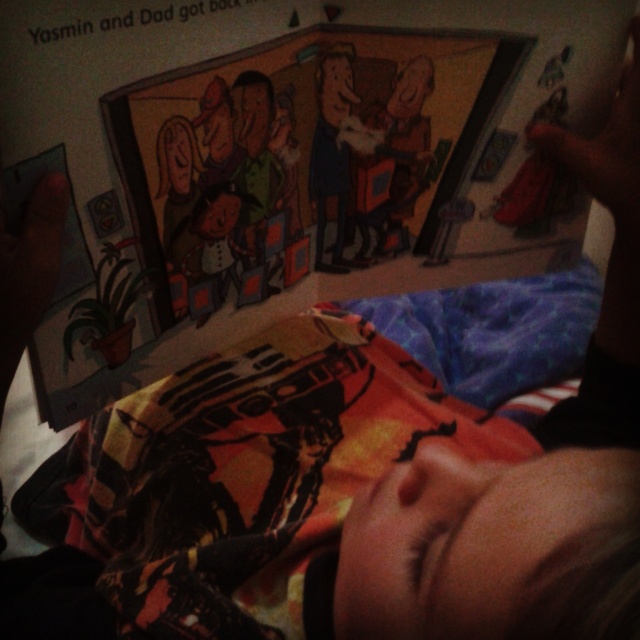
19:15: Lego boy reads me a bed time story.
If you want to read more Day in My Expat Life entries then please click here – and let me know if you would like to feature in this series!
———————-

7:45 am—8:00 am Our morning began with a deer sighting in our backyard. The kids did their best to scare it away but this deer was experienced in the ways of shouty children and stayed to munch on our grass.
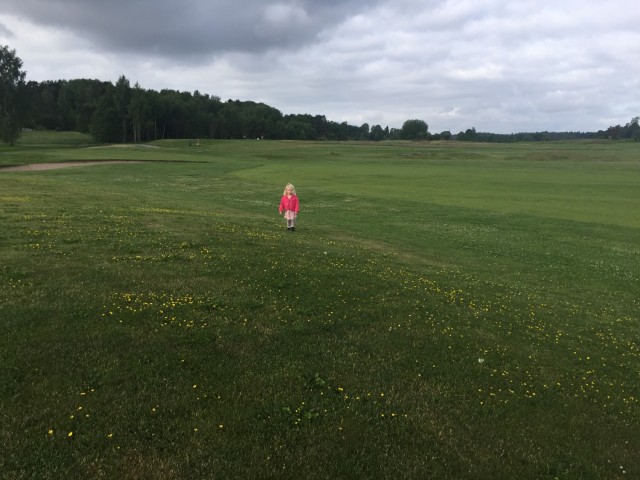
The golf course behind our house has a herd of sheep grazing in a fenced-off section of grass. We decided to go check them out before school.

No fish are in that pond. My son checked it out—all clear.

I’m not sure if the kids were impressed or bored with the sheep. Things got fun when the kids started shaking their rumpas at them. The sheep were a bit nervous with the display.
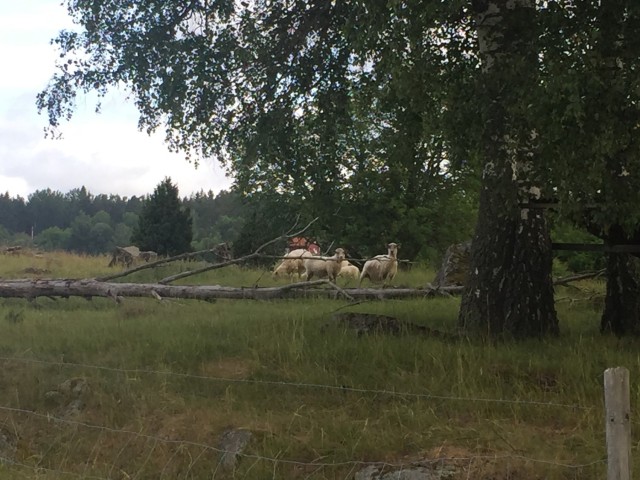
Very nervous sheep.
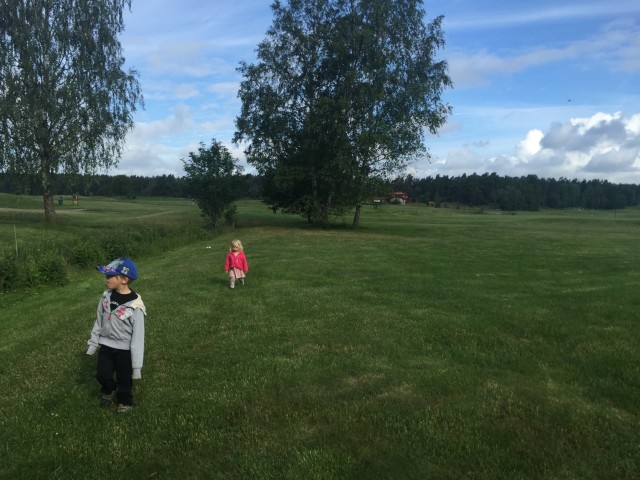
8:15 am – 8:30 am Time to head to school

Every bridge must be inspected for trolls. Troll-checking is a time-consuming activity but it’s for our safety, so it must be done.

Nope. No trolls here. No snakes either, despite a sign clearly depicting the presences of snakes. The kids were a bit disappointed.

Finally, we are on the way to school. A moped drove by and we stopped to wave hello.
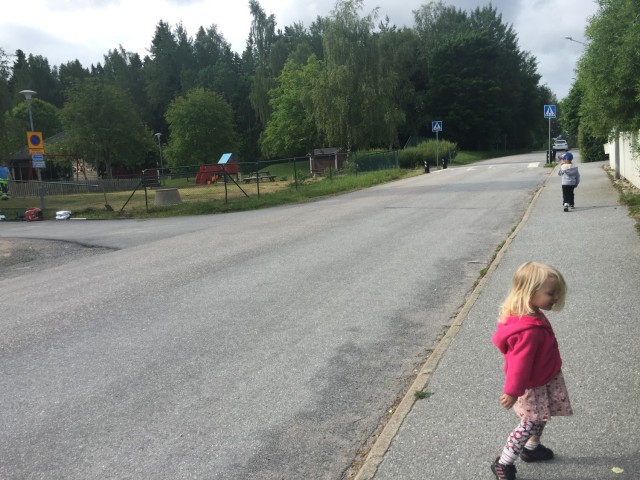
Finally! After a long walk of touching every slug in sight, we make it to school relatively on time.

With the kids at school, I need to run some errands. First up—filling up the gas tank with diesel fuel. This is always a costly errand but we only use the car once or twice a week.

Total cost: 720.90 SEK for 55 liters (equivalent to $6.04/gallon—much cheaper than the $8.50/gallon we saw when we first moved to Sweden.)
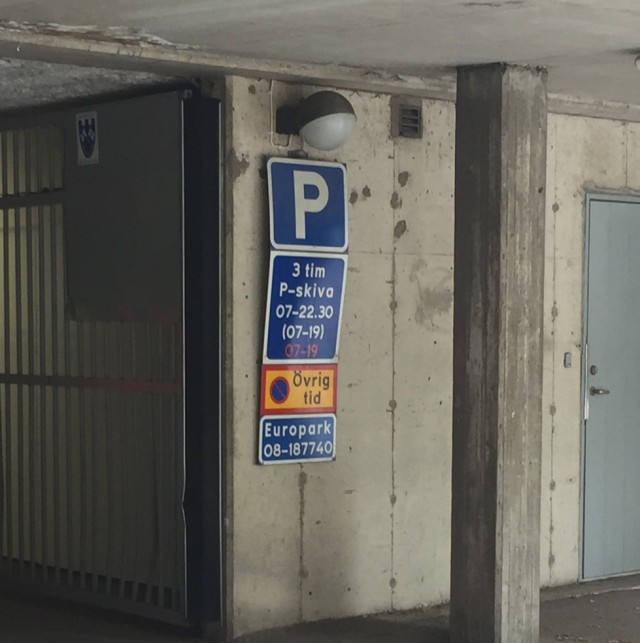
Acquiring a Swedish driver’s license is incredibly difficult and expensive (for non-Swedes and Swedes alike). This sign says that you can park for 3 hours M-F 7 am-11:30 pm, Saturdays 7 am– 7 pm, and Sundays and holidays, 7 am – 7 pm. You must display a P-skiva on your window shield.

The P-Skiva
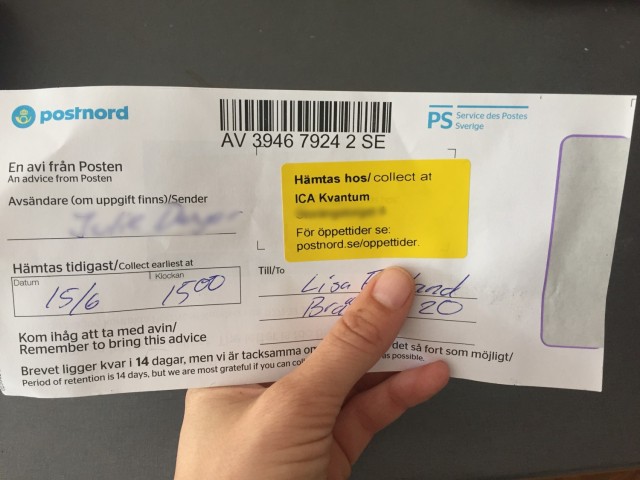
I received this notice that I had a package arrive and I can only retrieve it at the local post office, which is near the grocery store in town. Unless the package can fit within the dimensions of your mailbox, every package is kept at the central post office regardless if you live in a house or apartment.

The outdoor center of the shopping mall.

Inside the shopping mall—stores don’t open until 10 am, except for the grocery store and post office.
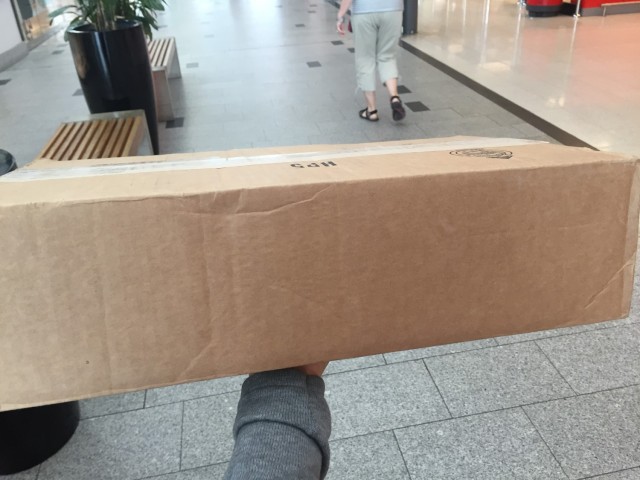
Ah, this box was larger than I anticipated. I had to carry it awkwardly through the grocery store while I did my shopping. Oh well.

I always check out the pastry section when I’m in the grocery store. I can’t help myself.

Delicious fikabröd or pastries for coffee breaks/fika
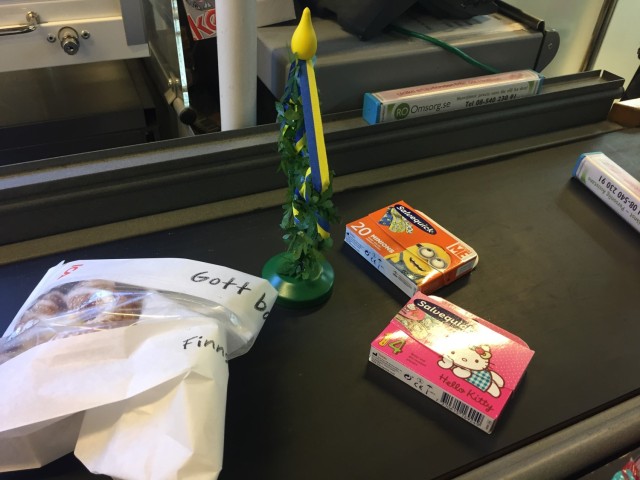
Due to my one arm being full of awkward box, I left with a pastry, a Swedish table top maypole flag (midsummer is coming up), and fun bandaids for my kids who like to use them as body art instead of covering cuts.
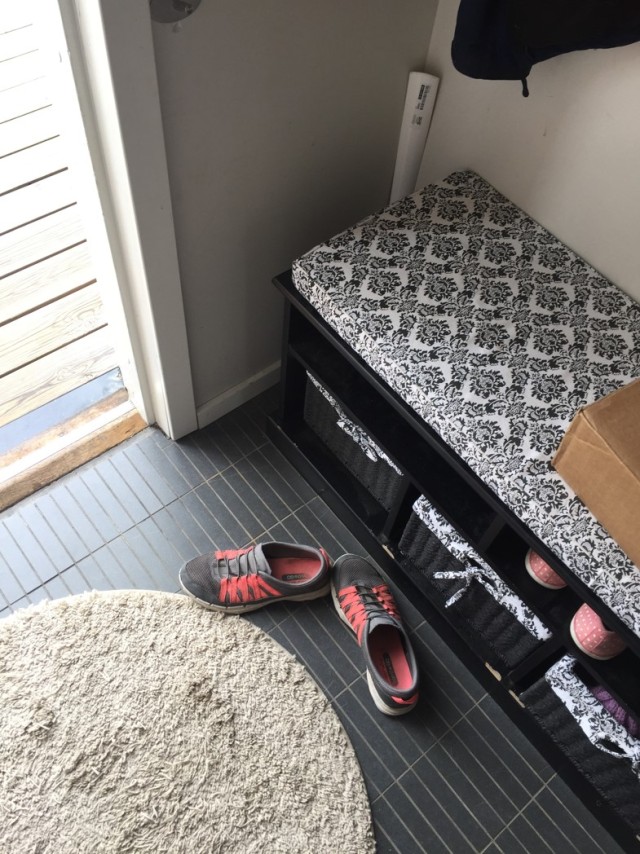
Swedes remove their shoes in the entryway. Sock fashion is very important in the winter.
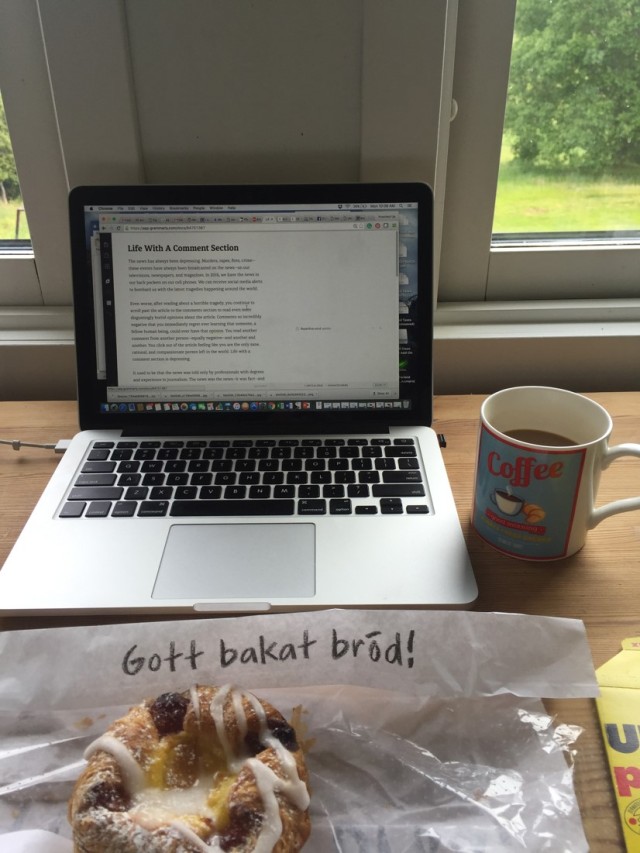
9:30 am – 3 pm Sitting at my desk in my home office with a little treat and some coffee and I’m ready to work on my writing.

3:00 pm – 5:30 pm I picked up the kids from school at 3 pm and we are ready to go off in search of new playgrounds.
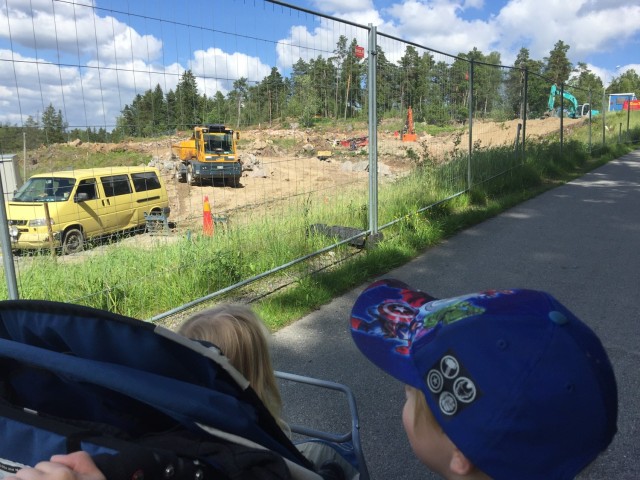
We pause at a construction site because they are dynamiting the granite rocks and the kids love the big booms

A new-to-us playground is nearby in a newly constructed neighborhood. This one made excellent use of the local rocks and they are perfect for climbing.
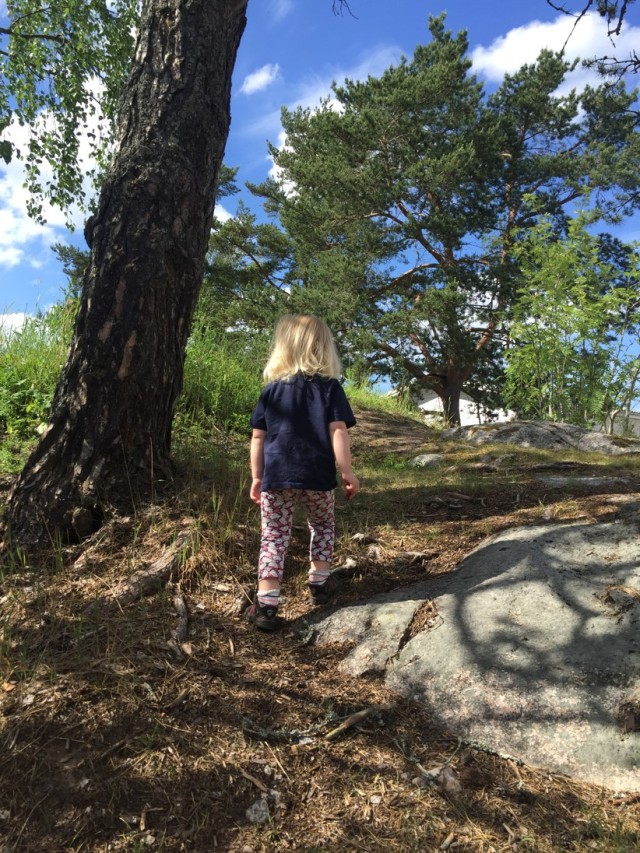
To reach the swing at the top, kids must climb up the hill.

A fun little hut that housed many spiders so the kids opted out.

Banana break in a shelter at the next playground

The last stop on our afternoon adventure was an outdoor exercise space that is the epitome of Swedish training. It is situated among the woods with a horse riding school nearby and people train by lifting logs on a fulcrum system.

The climbing wall was still under construction but we tried it out anyway

This exercise made me a bit dizzy as the logs went quite high.

Hey there, horsey. The local horses are always fun to watch.

More climbing

And dancing on rocks

On the way home, we saw a cat sitting in the woods. Cats are given free range in our neighborhood and we see them all over.
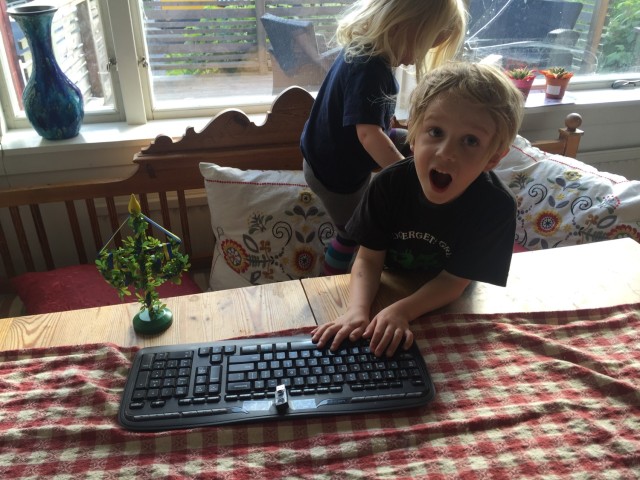
5:30 pm – 6:00 pm So, what was in that large box that I picked up earlier? A wireless keyboard courtesy of my mother. Now I can get to typing up my second book!
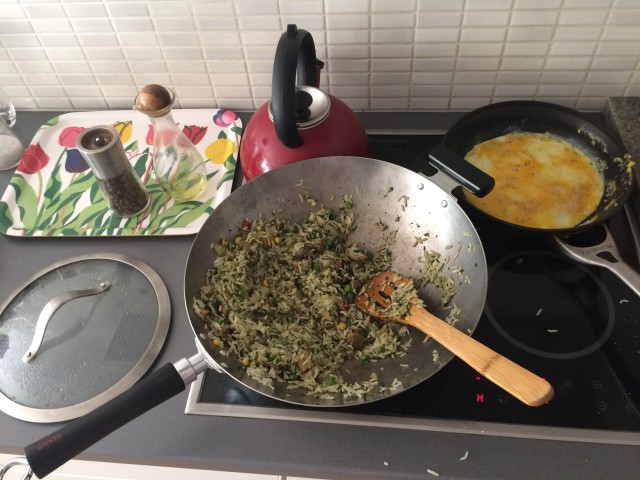
6:00 pm – 8:00 pm For dinner, we had stir fried rice with eggs from our neighbor’s chickens. The entire day was spent outside playing in the beautiful weather. The kids were exhausted and collapsed into bed around 8 pm. Tomorrow begins another day of more of the same.
Thank you to LIsa for that glimpse into her life – those pastries in particlar look delicious. I am loving the fact that so many of these Days in an Expat Life have so much in common eg walking to school, yummy food and working at a lap top – even though they are all in very different places! If you want to see more posts in this series please click here, and if you would like your own day to feature then please comment below or email me [email protected].
———————-
Clara sent out a call for guest bloggers a little while ago. I have been meaning to write a post about the normal day to day existence we have as expats in KSA (Saudi) and it seemed to be a good fit for a guest blog. With that in mind I kept my ‘phone with me for Thursday 9 June to document my normal day.
We have been living in KSA for 2 ½ months and really starting to settle in and get into a routine. We are still, however, in the transit house (we hope to move soon), are expecting our shipment imminently and are still waiting for our pets to arrive from Malaysia so I fully expect the routine to change shortly. Indeed I hope it does as I can’t wait to get the pets here and it would be lovely for Mini EE to have her own bed in her own bedroom and not have to put up with the travel cot in ours.
Ramadan arrived last week which has also had an impact on our daily routine. The children have a later start at school, a much more civilised 08.30 compared to the awful 07.30 and shops, restaurants etc are shut until after sunset in theory and after 21/22..00 in reality.
06:30
Mr EE’s day starts a little earlier than ours, he has to be in work for 07.20, he will usually bring the children in to school with him (he is their Headmaster) but there is little point in them going in early to sit around doing nothing. Instead they can get up a little later and have breakfast at home.
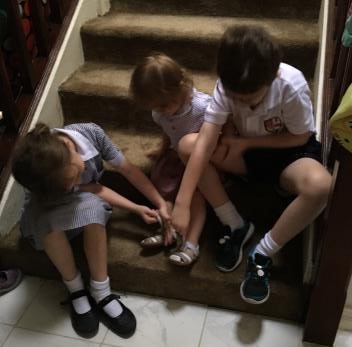
08:15 Once the older children have eaten, tidied and made their lunch boxes Master and Miss EE help Mini EE to put her shoes on and pack her bag for ‘school’ (she goes to the school Crèche every day).

The school is next to our compound and the two are connected by a door so the older two children can come and go as they wish and I don’t need to wear an abaya when I do the miniscule school run. Master and Miss EE sometimes take themselves to school in the morning but they often prefer to walk with Mini EE. They are desperate to be allowed to take her to school on their own, perhaps when she is 4 years old….

08:45 After dropping Mini EE at crèche I aim to fit in some exercise. This is an activity that is often more avoided than engaged with, but I have been pushing myself to do more. Some days I go for a swim, the compound has two pool areas and both are quiet, other days I take myself to the gym and go for a run. I prefer to run outside but the only suitable space is the school athletics track which is out of bounds during the school day (for obvious reasons). This morning I went for a swim, I have been doing about 30 lengths a time but the pool is only short so I aim to get this up to 60 and then 100 in the next few months.
09:45
After my swim and a wash and dress I tidied the house and put the laundry on. The older children are responsible for keeping their rooms tidy, Miss EE does this rather more successfully than Master EE but the rest, other than the two days we have someone in to help, is down to me. We are hoping to employ a full time maid in due course but this is a long way down the list of things we need to sort out.

10.30 After cleaning and tidying I hung up the washing and then allowed myself a 5 minute coffee break before starting work. I would love a job here in Saudi but with all the hassle of the move and all the things still to sort out I decided to wait until after the summer to search for a job and, of course, a work permit. In the interim I freelance through Upwork and get paid into our UK account. The transit house has no space for a home office so I tend to work at the dining room table, it is not really ideal but much better than perching the laptop on my knee. If we move to a larger house I will be able to get a desk, either in our bedroom or on the upstairs landing. Malls open at about 10 so I sometimes get a taxi to one of the many close to our compound if I need to pick up essentials, I won’t bother during Ramadan as daytimes are a little dull.

12:00 At around lunchtime I start preparations for the evening meal. This house has no stairgates and Mini EE has learned to climb out of her temporary play pen so prepping early gives me a chance to get everything set up and ready to go later on in the day. This means that if the older two decide to go out I am not cooking while keeping an eye on Mini EE. Today I made a tomato and mozzarella salad and put some chicken breasts in the oven to roast. I often need to pick up some extra bits and pieces (milk, eggs etc) at the compound shop and if I do I generally go about this time.

He stocks a basic range of vegetables, fruit, dairy products and snacks and is handy for top ups between big shops. I rarely eat breakfast or lunch during the week so will often pick up a biscuit or bar of chocolate when I go over. They stock my favourites, Stroopwafels, a Dutch caramel biscuit and I eat far too many of them to be healthy (you can see a pack behind my computer).

The compound is teeming with cats (I even wrote a blog post about them here). Most of them are semi feral. Some are friendly but they are all endearing. A stunning Van style cat lives near the shop and will often come over to say hello when I pop over, probably in the hope that I will drop a morsel for him.

I bake a loaf of bread fresh every day, flat Arabic bread is lovely but useless for sandwiches or toast and while there are very good French bakeries that do lovely bread, I can’t get there on a daily basis. I can get plastic sandwich loaves in the corner shop but I don’t like the taste or texture so I brought my bread machine back from a recent trip to the UK. I have been working my way through the various different recipes that came with the machine. So far the thumbs up have gone to the plain loaf, the pesto and pine nut loaf, the cinnamon raisin and the tomato focaccia. The soft rolls (which mix in the bread maker then cook in the oven and which I stuff with feta and herbs or olives) are another particular favourite.

Today I simply made a garlic pizza bread to go with supper and then put a plain loaf on to bake. In between I was able to do a little more work.

14:00 By the time I finished preparing the supper and the second batch of bread the children were due back from school. I usually walk over to get Mini EE from crèche about 14:00. By the time we have said our goodbyes to the teachers it is around 14:10 or school leaving time. We walk back past Master and Miss EE’s building, sometimes we catch them, sometimes they are waiting for us at home. The older two like to take about 30 minutes to relax, have a drink of water and play with Mini EE before getting changed and doing their prep or any extra work that I give them at home. Miss EE has reading every day and will often read her assigned books to her younger sister. I didn’t manage to get a photograph today but here is one from a few weeks ago (when, for some inexplicable reason she decided to do her reading in her bedroom).

I love baking and Miss EE enjoys helping me. Sadly the oven in our last house was an absolute disaster and made baking a near impossibility. The oven here is a little slow but is a great improvement and means that we can enjoy cake again. I usually bake a loaf cake so that the children can take slices to school in their lunch boxes but today I decided to do something different. I had seen a Betty Crocker Ramadan advert for rose and pistachio cupcakes (made using something called cake mix!) and thought that with a bit of playing around I could emulate those with a normal homemade cake batter. The experiment worked first time, the cupcakes were a great success and something I think I might add to my regular baking repertoire.
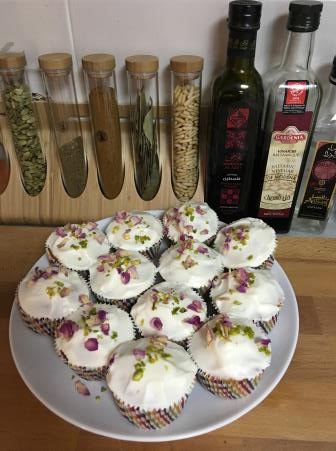
17:00 The cakes had cooled enough to be iced and sampled (with a pot of rose flavoured tea of course).
Normally Thursday nights are our heavy grocery night. Mr EE finishes work on time and we get his driver to drop us off at one of the big malls. We usually grab a burger (Hardees, an American chain, are our current favourites) during sunset prayers then we pop into the supermarket just before night time prayers and browse in relative calm (the supermarket does a ‘lock in’ during prayers). We can also pick up any clothing items the children need, browse for new books etc in the other shops in the mall. Ramadan has put this Thursday ritual on hold. As luck would have it, Mr EE and I had been invited to a goodbye party for someone from another company that he has been working closely with so we would not have been able to get groceries anyway.

18:00 The babysitter arrived. I dressed the salad, warmed the bread then cut the pieces of chicken I had roasted at lunch time before putting them into some pasta with pesto and cream to make supper for the children then quickly got ready to go out.

18:45 The party was off site (you can just see my abaya over my left arm in the picture). It was a good chance to catch up with Mr EE who had been very busy at work, he was hardly home all week and due to be working most of the weekend. It was also a good opportunity to meet some more people. I am always keen to extend our circle beyond work and our immediate compound wherever possible.

19:15 The party was not far away but Thursday nights are the start of the weekend and the roads are normally crazily busy. A week before we had gone to the same venue and the journey had taken us almost an hour. This time around the roads were almost deserted for iftar (break of fast at sundown). A few people were handing out or selling water for those who had not made it home on time. Most of our friends who are fasting say that not eating is not a problem at all but they find the not drinking very, very difficult. Our journey was so quick that we arrived early.

22:30 Tired from a long week we left the party early (Jeddah is a night life city and gatherings and parties, particularly during Ramadan, can go on until the not so early house). The event was quite close to one of the Jeddah landmark hotels which the children and Mr EE think looks like Avengers HQ. The lighting is certainly quite spectacular although my ‘phone did not do it justice.
Thank you to the Ersatz Expat for this glimpse at her daily life – that bread from your breadmaker looks so familiar from our days in Pakistan! I also love the look of those cupcakes…. Please check out the other posts in this series by clicking here, and in the meantime if you would like me to feature a day in your expat life please leave a comment below or email me [email protected].
—————————
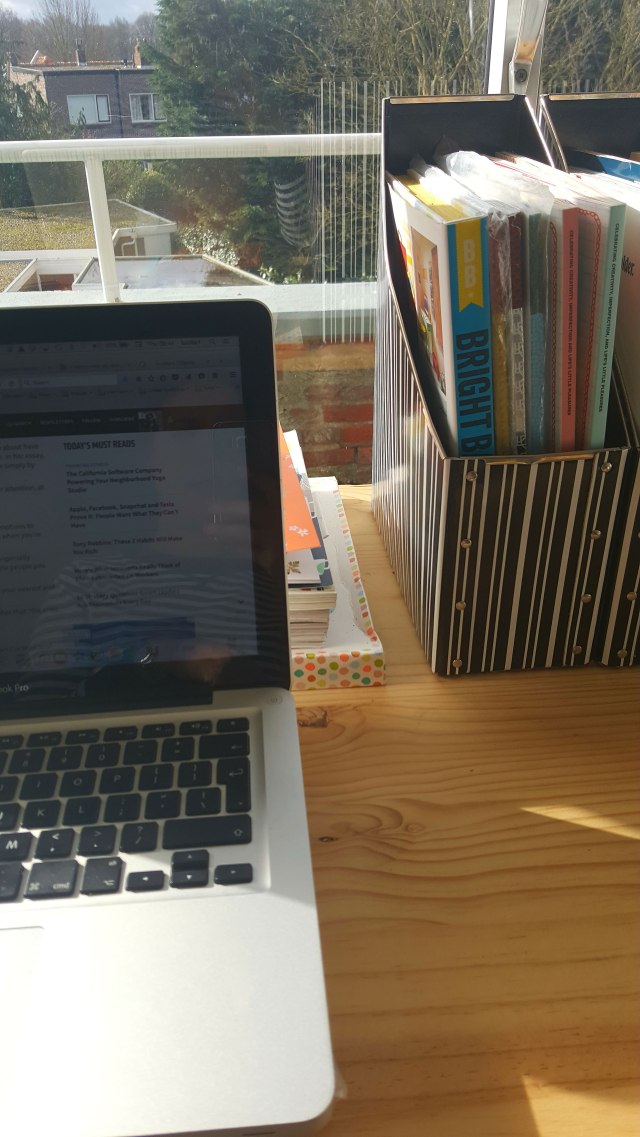
5:30am – I’m an early riser, a habit I formed when we lived in South Africa and would go running at 5:15am! In The Netherlands I still try to get up very early so I can work a bit in peace. In the summer it’s light fairly early, and by 7 the sun shines through the window on our top floor…if it decides to shine that day
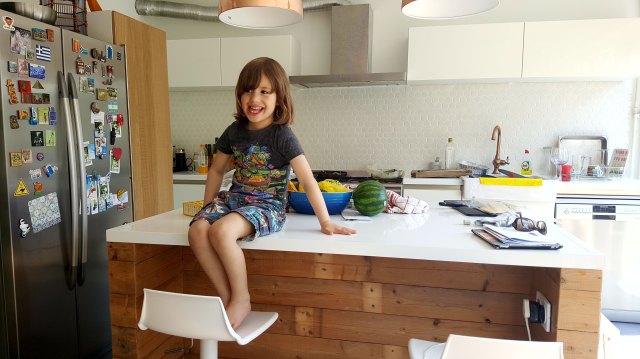
7:30am – The kids wake up and come downstairs. I make them breakfast and they sit and eat at the kitchen island while I make their school lunches so we can chat. The school days are so long in The Netherlands – 8:45-3:15 – so these morning chats are an important part of our day.
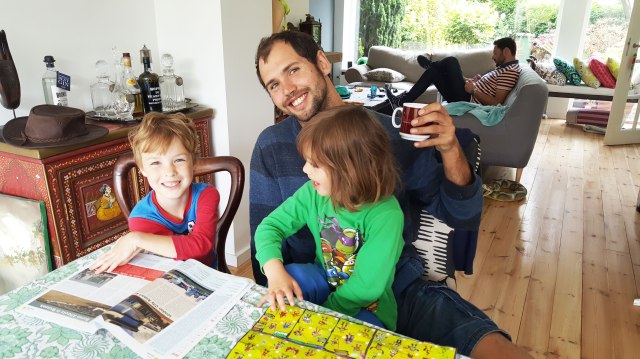
8:15am – My brother Jake is visiting from Australia, and so the kids don’t want to get ready for school, and would rather listen to his stories.
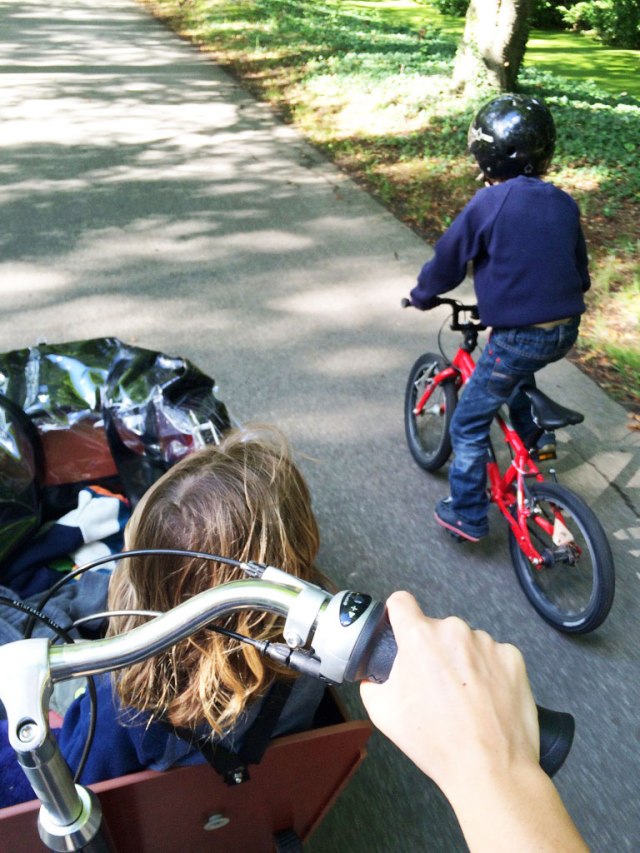
8:40am – We’re off to school, late as usual. Even when my brother is not visiting we are usually late. I am actively trying not to nag my kids in the morning, not to hustle and shout and bribe them out the door. The result is that we are nearly always 5 minutes late for school, but we are relaxed and happy so who cares! When we moved to The Netherlands I decided not to get a car, and to only cycle. My 6 year old cycles, my 4 year old goes in the Bakfiets.

9:15am – I’m off for a run. I try to go at least three times a week, even if I’m super busy. It’s important to schedule exercise into my week. There are the most beautiful trails around our house. I can run through forests, farmland or to the beach through the dunes which is my favourite run. The weather isn’t always this good!

10am – This is the beach I run to. It’s sandy and wide and on a sunny day is lovely. It’s 10kms there and back, perfect.
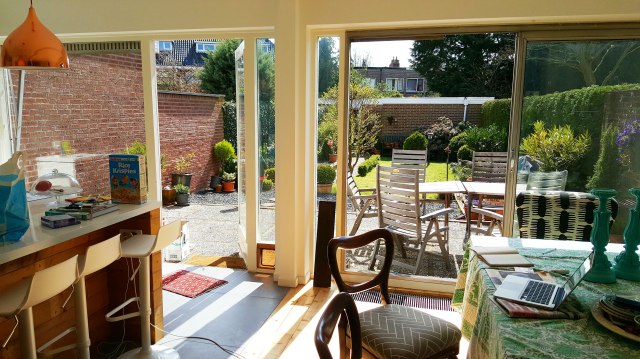
11:30 – I’m home, have showered and eaten, and it’s time to work. Work is my freelance writing, posting on my blog, or working on the copy writing business I’m starting. I don’t run everyday so usually I start work at 9 after cycling the boys to school. You’ll notice the kitchen is still a bit messy from breakfast this morning, it just has to stay that way for a few more hours! If I don’t start work now, I don’t get enough done by the time I fetch the kids.
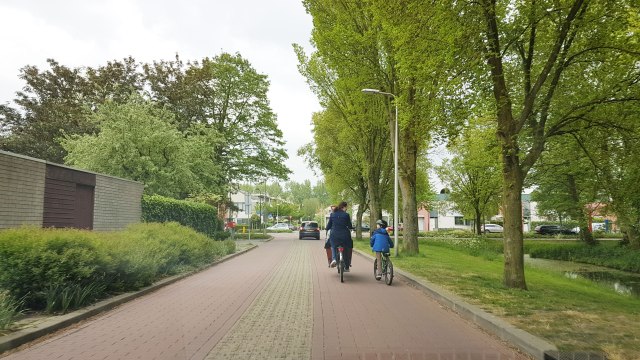
2:30 – Once a week the kids finish school at 2:30pm instead of 3:15, so off I go to fetch them. They attend the American School of the Hague and it’s in a lovely green area. The cycle is really lovely, and only five minutes from our house
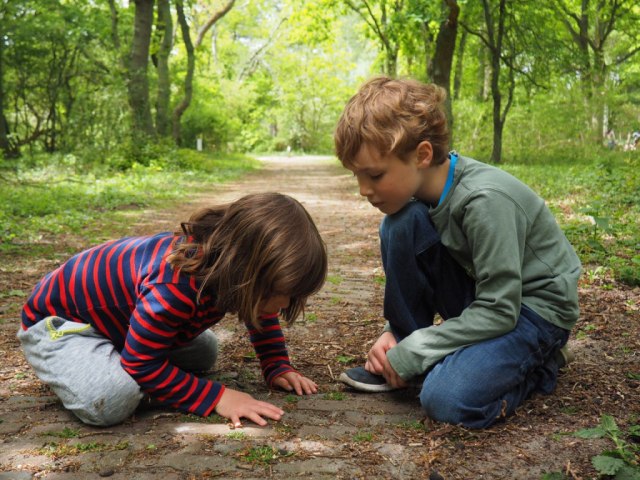
2:45 – On early release days I usually pack a snack and we cycle to a forest (there are a few to choose from) and go for a walk. It’s so important to me that my kids relate to the natural world, I think I’m winning because they get so excited when they see a blackbird or magpie or some cowslip!
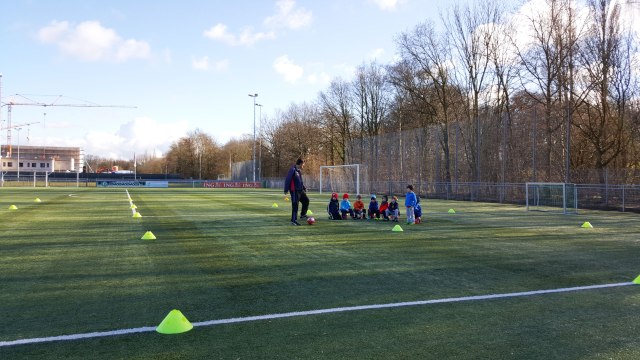
4pm – Monday is football practice. That’s the new American Consulate being built in the background.

5pm – If (and only if) I’m super organized I don’t need to go to the supermarket after football, but sometimes we stop on the way home to buy dinner. The main supermarket chain is called Albert Hein and it’s pretty fantastic with fresh produce and a wide variety. It doesn’t really compare to Woolworths in South Africa, but I don’t think anything can!

6pm – Straight home to Uncle Jake who is here from Australia to landscape our garden and who has been working hard all day! I make dinner while the boys play or watch TV. I cook separately for the kids because my husband only gets home late and we eat then. Weekends are our family meal times. That’s the reality of an hour-long commute to the office unfortunately.
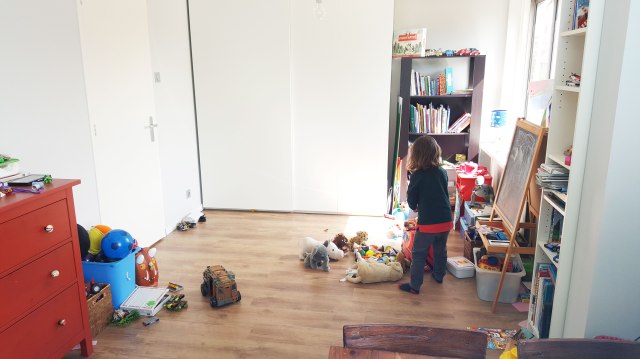
6:30pm – Playtime, bath and story. We all get into one bed and read a story. We just finished The Lion The Witch and the Wardrobe, and the boys were utterly enchanted. Now we are reading James and The Giant Peach which is such a great book. I love reading these books for the first time in almost 30 years!!
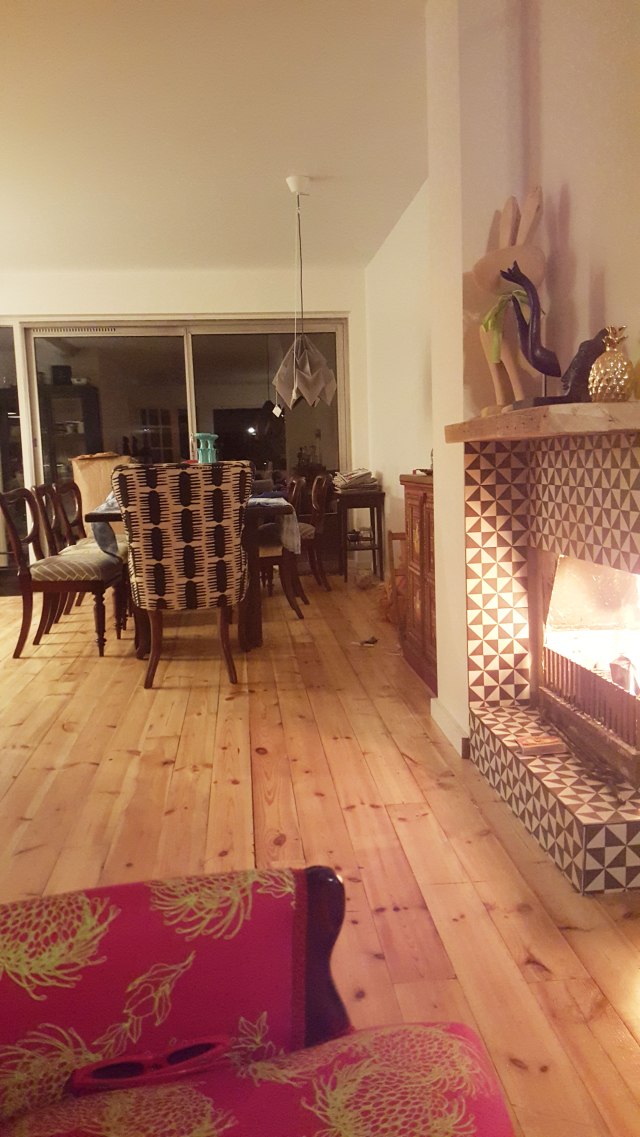
8:00pm – That’s it, days done. The boys have been asleep for a while already. I’ve cooked, my husband arrives home and we eat. If I need to finish up some work I do, but we usually watch an episode of something, maybe Outlander or Game of Thrones. I’m usually in bed by 10pm so I can get up early and do it all over again!
Thank you Lucille. The Hague was one of the places we applied for when we got this posting to Pretoria and although I love my South Africa life I can’t but help feel a little envious of this wonderful day with its cycling through greenary and runs on the beach!
Don’t forget to read the other posts in this series by clicking here.
**********
My partner was always very honest with me. There was a chance his job might be moving overseas, and it was more a question of when rather than if.
I have always found myself torn between two separate paths in life. The first is the kind of ‘normal’ one I suppose – go to school, get a good job, a house, get married and live happily ever after. I am a self-confessed homemaker.
The second, however, is the travelling path. I would love to see more of the world and experience new cultures. When I was growing up I always said one day I would like to spend a year or two living and working overseas.
So when my partner told me we were moving to Toronto, Canada I was excited. There were the initial stresses to deal with – like packing up our house, sorting out shipping and leaving my job. But I loved the idea of Canada. I looked forward to spending my weekend’s hiking in mountains or hiring out cute log cabins by a snowy lake. And I could not wait to go exploring all the cities in North America that I’d always wanted to visit. These would now be on the right side of the ocean for us.
Yet lurking underneath all that anticipation, buried somewhere deep in my subconscious was a growing anxiety.
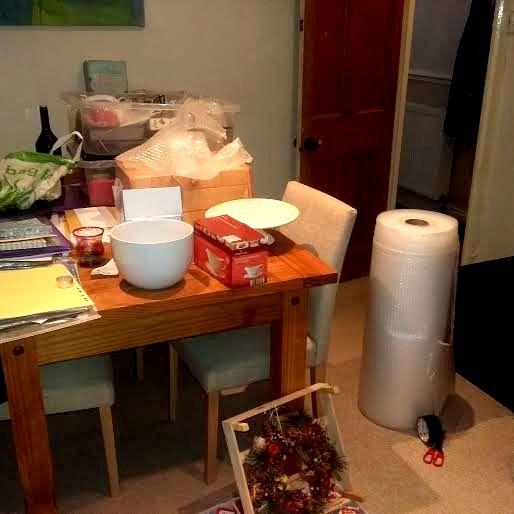
Bubblewrap! Starting the long task of packing our stuff in Bristol.
Leaving England was stressful. Only a couple of days before our flight I was still trying to shift our stuff on gumtree whilst my partner did multiple trips to the dump. Well after dark on the day we were supposed to move out of our house in Bristol, we were still cleaning and sorting out what would be coming with us, and what was going in the bin. It didn’t help that I had come down with the world’s worst (and most badly timed) cold and was feeling entirely wiped out.
Waving goodbye to our house somewhere close to midnight, we drove to my partner’s parents to stay the night before our flight. I felt so nauseous I had to stop the car to throw up. The illness (and general exhaustion) was probably partly to blame, but also the brewing nervousness.
In Toronto

Me, my partner and the CN Tower
The first few weeks after you get off that flight will be the hardest. We had two days in Toronto before my partner returned to work in his new office. You feel like you have to squeeze everything into that short period of time. It is a whirlwind of trying to get the important stuff done – such as opening bank accounts and setting up phone numbers. But mixed in is the desire to learn your way around the city and make the most of the time you have off together before work takes over. I was glad we managed to find the time to have some fun and fit a little of the touristy stuff in, such as visiting the CN Tower.
It was after he went to work that supressed bubble of anxiety really shimmied its way to the surface. I had this sugar-coated idea in my head before arriving in Toronto that I would spend this time getting to know the city. However, in reality there is only so much exploring you want to do by yourself. Plus there’s the ever growing guilt that you are not working and therefore should really hold back on spending too much money.
I quickly realised I do not like being dependent. I have always worked since the age of thirteen when I had my first paper round. I do have a work permit here, but I found the process of job hunting agonising. Trailing though endless pages of job advertisements, half of which specify applicants with Canadian permanent resident status will be prioritised was an incredibly de-motivating experience.
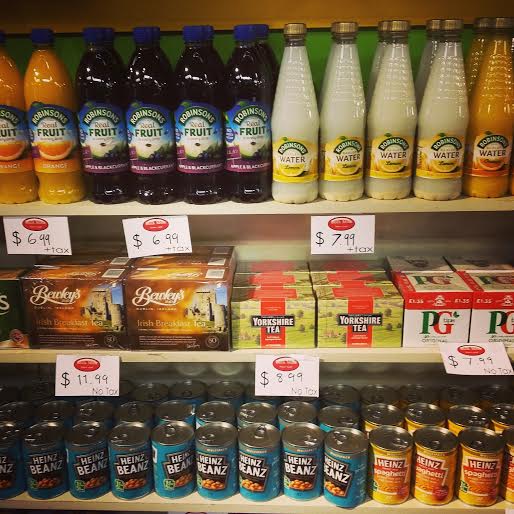
Far too excited to find a shop selling British baked beans and squash! (not at all: I think we all know where you are coming from – look, Yorkshire Tea! Ed).
I got into the habit of researching trailing spouse syndrome online and convinced myself I was doomed to two years of depression and there was nothing I could do about it. Finding some temping work pulled me out of that routine. It stopped me sitting in our apartment thinking, or getting frustrated at job hunting all day. And even though I am not working again now and those niggles do still exist, after three months of being here I am able to enjoy having the opportunity to spend my time writing, cooking and doing the things I love. Things I wouldn’t normally have the time to do when working a full-time job.
I don’t want to make this all sound too negative. Things do get better once you get over that initial first month hurdle. Yes you will undoubtedly sob into a cup of tea wondering whether you made the right decision and consider getting on the next plane home at various points. Yes you may go slightly loopy some days, and I certainly crave that path one lifestyle from time to time. However, if I could go back in time six months I wouldn’t change my decision to move overseas and become an expat partner. Most days I really love being here, and for every day I want to go home there’s another where I am thinking about where might be next on the list after Toronto.
On top of all the obvious positives of seeing a new place, meeting new people and learning about new cultures, I have found this an opportunity to learn what makes me happy. I have realised what is most important to me – and who is most important to me. You learn who your true friends are. It gives you the chance to step back, re-evaluate and maybe write a whole new path for yourself.
Three months in and Toronto is bright and blooming. It is summer here now and the weather at least certainly beats the grey drizzle England promises most of the year around. Toronto is a really great place – and I have still only seen the tip of the iceberg!
There is still a lot to learn and a long way to go until I will feel completely settled, but I am starting to realise it is OK to not have everything neatly in place.
I have now come to the end of my series but I didn’t want to finish without a summing up: links to all the posts and a conclusion. But this doesn’t mean for a moment I have finished with the topic – it’s something I feel I will come back to, will be a backdrop to many of my posts, will always be there when I think and write about expat life. I hope that by posting on this topic I have been able to help others, even if it has just given them an opening to discussion or a pause to reflect. As always, comments and feedback are welcome.
Introduction
I started the series with an introduction to the topic, explaining the reason I had decided I needed this series was because an older post about depression I had written last year was one of my most read blogs – getting hits on it almost every day. This proved to me that a lot of people were putting the words “expat” and “depression” together into search engines – and looking for help.

What is expat depression?
In my second post, I tried to unpick what was actually meant by the term “expat depression” but realised in the end that although there definitely is such a thing as “situational depression” caused by the situations we find ourselves in, depression is depression however or whatever it is caused by and needs to be treated accordingly. I did conclude however thar there are definite commonalities amongst expats who fall into the “depressed” camp one way or another and it was these commonalities I wanted to focus on.
When and why does it happen?
My third post started using some of the real-life experiences told to me in the survey I used as a basis for this series. This is where commonalities really started to become apparent. From the shock of the move to isolation and lonliness, loss of identity and control to repatriation – the same causes or at least catalyst of depression came up over and over again. As I said in this post:
Hopefully by recognising possible danger points in the expat cycle, I can help you be more prepared
What does expat depression look like?
Next I asked (and hopefully answered) the question: what does expat depression actually look like, how to recognise it for what it is and thus start to seek the help you need? Again, there were a lot of commonalities in my responses – from very emotional reactions (anger, tearfulness, frustration) to listlessness and feelings of wanting to shut yourself away. Food and alcohol issues were also two themes that came through in the survey.

Overeating or eating unhealthily – one of the possible symptoms of depression.
Could it just be culture shock?
“I definitely knew and understood the concept of culture shock. By this point we had been there almost two years so I think I had gotten over the culture shock part and was resigning myself to the fact that no matter what I did I would never be able to thrive in this environment.”
My fifth post posed the question how to distinguish between culture shock – the emotional roller coaster that many of us go through at the start of a new expat life – and depression. This is a subject I had already tackled in my book the Expat Partner’s Survival Guide as I thought it was important for people to realise that very intense emotions are likely to be a normal part of their expat experience – but then also to understand when what they are feeling is something more.
Through researching for this post, I reached the conclusion that actually the two are so tightly intertwined that it’s often hard to say when culture shock ends and depression starts. But at the same time I truely believe that a really good starting point for any expat (or expat-to-be) is to read up on and gain a proper understanding of culture shock. We all know ourselves better – hopefully – than anyone else does. So you are in the best place to understand whether what you are feeling is simply down to the stresses of living in a new and alien environment….or whether it’s moved past this and heading into depression.
Help
Having now thoroughly tackled what expat depression looks like and how to recognise that is what it is, I turned to the question of how to help yourself. I did this over the course of two separate posts – the first discussed self-help methods, and the next how to look for professional assistance.
The self-help post had lots of good ideas, from finding a routine to getting a dog. Many people though agreed that these methods should be done alongside seeking the help of a professional such as a counsellor or therapist and the second post discussed the sort of help people looked for and where they found it. I included a list of therapists who specialise in helping people who love overseas in this post.

Helping others
I wanted to look at what to do if it wasn’t yourself you were worried about but rather a friend, a partner or anyone else you knew in your expat life. We often get close to people very quickly when we first relocate – but still it can be very hard to know when someone needs help because depression isn’s something that gets talked openly about very often. This post talked about how important it can be simply to be there, to invite people out, to talk and to listen to them. Even if you never actually touch on the subject of depression, just being there for someone might be helping them more than you would ever realise.
What about the employers?
My penultimate post in this series (if you ignore this one) looked at the role of employers. The verdict was split as to whether they should have a role at all in this area – especially when it comes to the partners of their employees rather than the employee itself. But after reflecting on this subject, my feelings are that so much of what we experience is tied to the situation we find ourselves in so perhaps the employers should be more aware of this issue? Maybe by being more proactive in this area they could stymie some of the problems before they escalate to the point where problems are going to lead to things like relationship breakdown or even their employee leaving the post. There was certainly a lot of food for thought in this one.
Repatriation
Finally, I felt I couldn’t leave this topic altogether without talking about repatriation. Frequently overlooked as a catalyst for depression, returning to your home country is often said to be the hardest part of relocation. Maybe because people don’t expect to feel this way and are therefore underprepared, maybe because the changes that happen to someone when they become an expat can make returning to your old life very hard indeed or maybe just because it is another flash point in the expat cycle I don’t know. But what I do know from all the informal research I have undertaken in this subject area is that repatriation is something that should be ignored at your peril.
And the conclusion is?
So that in a nutshell was expat depression. Or at least, it was my take on the subject. What can I take away from my experience of writing these posts? That although there certainly is no one-size-fits all approach to an illness like depression, there are commonalities. That we can all help each other just by being aware what others may be going through. Becoming an expat – especially if it is for your first time, and even more especially if you are the non-working partner – can be a difficult and frightening thing. Knowing that you are not alone, that others have gone through and continue to go through the same feelings that you are can e a huge help. On top of that though often what you need is more – and don’t be afraid to seek help from a professional if you think you may be depressed, even if you are not 100 per cent sure. The lines between normal feelings and clinical depression are very blurred so don’t leave it to chance or hope it will go away. Get that help earlier rather than later and then, hopefully, you can start to enjoy your expat life. Most of all though, never be ashamed of what you feel.
Well, you are who you used to be but you would be forgiven for feeling this way because this is how you will be treated from now on. As the sidekick. The uninteresting one. The one to avoid at parties (that is if you are ever actually invited to any). Never mind that you used to be a doctor or a lawyer or a nurse or a teacher or whatever it is that you did back in your home country. And never mind that actually you have a life here too, possibly even a job. As far as many people you meet are concerned you are a nothing. Your status is somewhere lower than the dogs and actually the only use you have is smoothing the way for your partner’s brilliant career.
But don’t judge us because we are not those nobodies. We were and dammit we still are very big somebodies. There is nothing worse than being ignored because you don’t work in the office of the people you are meeting. Even worse for those of us who USED to work in that office and therefore actually could join in the conversation. As far as those people are concerned your brain is made of cotton wool and you couldn’t possibly have an opinion on anything useful!
This has happened to me here in Pretoria – with a few very honorable exceptions in some of my former colleagues who actually deem me fit to discuss what they do (and no I don’t expect to know everything and yes I realise that even though I have signed the official secrets act that was a long time ago and by now out of date so I don’t expect to be filled in on everything that is going on). As far as most people here are concerned I am fluff. I am my children’s mother, my husband’s wife. I am not a person who needs to be acknowledged.
Added to this sense of frustration is that everything I need to get done has to go through my husband. Want to open a bank account? He needs to get the ball rolling because I don’t work here. Something wrong with the house? Needs to go through his office. Flights home? School bills? Even medical treatment? Yup you guessed it – through his office!
We went to a party the other day thrown by someone fairly high up in diplomatic circles here. We were guests because I am friends with the fairly high up person’s wife. It was so refreshing to be there because of me not because of my husband – refreshing for him as well as me because he didn’t have to feel like he was working. It was a great night, I met some fun people and never once felt like I shouldn’t have been there. I was invited as me, not as the other half of the main man.
It’s frustrating and I know it is felt by many. What to do about it? Well if you are reading this and you know people who are the partners then ask them what they do or did, be interested in them, ask their opinions (some of us even do things like follow the local news and – shock horror – spend quite a lot of time getting to know our host country by interacting in various ways with the locals). Realise that they have a brain and treat them accordingly.
If like me you are the fluffy sidekicks then lets reclaim ourselves, our identities. Perhaps when we meet people and they ask why we are here the first thing we say SHOULDN’T be what our partners do or where they workbut rather why we decided to come with them. I wanted to travel. The opportunity to see more of the world was too much of a temptation to turn down. I decided it would be a good way to get my novel finished and do some more scuba diving.
And then, before they can start looking at you down their noses trying to sum up whether you are worth another three minutes of their time or not, be the first to move. Tell them you need to be somewhere or you’re on your way to the bar for another drink. Smile sweetly and walk away. Leave them wondering.
And always remember, whatever your situation, you are important. You are not a nobody you are a somebody and you always will be. And anyone who judges you because of what you do or don’t “do” isn’t worth another minute of your time anyway.
Here’s to all us expat partners – may we ever realise just how bloody important we are!